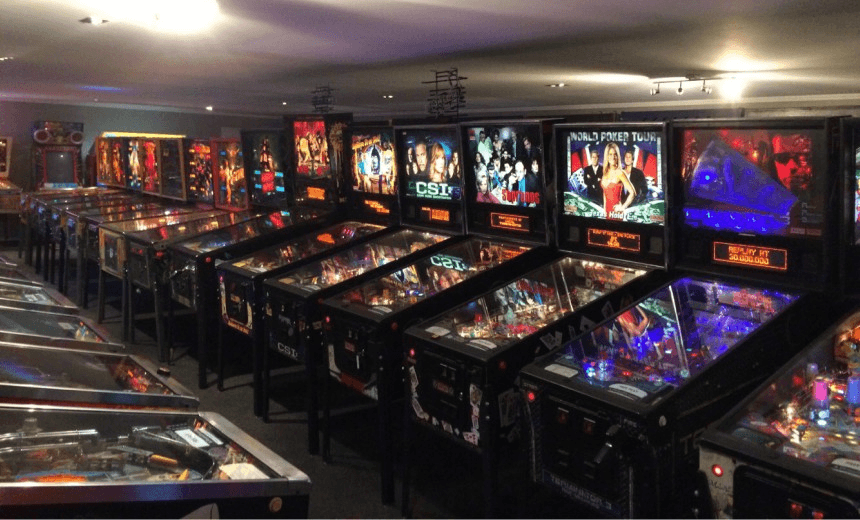The largest collection of pinball machines in the country resides in a Pukekohe family home. Madeleine Chapman visited the Peck family to see it in the plastic flesh.
I tried to look nonchalant as the small metal ball rolled around the bumpers, hit a spring, and shot right down the middle, missing both flappers and signalling a game over. I looked up at the LED scoreboard and saw ‘6700’ flash up in red. 6700 runs in a cricket career is pretty impressive, 6700 points in a game of pinball is dismal. Danni Peck, standing next to me and trying (maybe) to be polite, just laughed. At 15 years of age and the second best pinball player in New Zealand, she probably laughs politely at most people she observes who think that because they used to be good at the one game in their local fish’n chip shop, they could probably go pro.
Unfortunately for most of us, that’s simply not the case. Danni has grown up in a life of pinball. Her dad, David, is the original pinball enthusiast and current number one player in the country. “At the moment Dad is better,” she says, “but I’m coming for him.” In their spacious home in Pukekohe, one huge room houses around 100 pinball machines.
When I go out to visit them at home on a dreary Saturday night, David is busy fixing one of the machines in order to get it ‘match ready’ for a big tournament they’d be hosting the next day. “It’s a full time job fixing them all,” he tells me, which makes me wonder how much money one could possibly make fixing pinball machines. But that’s not David’s job, he’s simply taught himself how to navigate the electrical circuits in the years since he bought his first ever pinball machine at 19.
Most of the time, the machines stay dark and unplayed. Hulking beasts just waiting to come alive at the flick of a switch. I’m a little disappointed that they’re all turned off when I arrive, it’s like seeing a Christmas show where all the lights are out.
Growing up and constantly being told off for leaving the lights on and wasting electricity, I was almost too scared to ask how much it costs to run 100 arcade games at once. “$75 a day,” David tells me, “but they’re off all the time except for tournaments.”
While a lot of tournaments overseas are held at special arcades, New Zealand doesn’t have one big enough so families like the Pecks host other players and facilitate the tournaments with their own private collections. At 127 machines, the Pecks own the largest private collection of pinball games in the country and as such, are able to host even worldwide competitions in their own home. The tournaments are similar to the America’s Cup in that the hosts can adjust their machines how they like – some tournaments are known for having very old machines that are much steeper and harder to play on – so long as everyone is playing on the same machine.
“We set up the machines pretty tough,” David explains, “because if it’s too easy it just gets boring for us.” I nod along, still not entirely convinced pinball is a game that’s won just by skill and not luck. “Luck definitely comes into it, especially when the machines are set up tough. I just got back from the World Champs in Denmark and didn’t do well at all, just had no luck for those two days.” It’s strange to think that someone so good at something could still perform terribly because of luck. I’m not sure I like it – I’d much rather lose knowing it’s entirely my own fault than lose because I had bad luck.
David shows me a Muhammad Ali machine that they’ve just bought, to show how unpredictable pinball really is. “I just played before and I rolled it, which means to put the score over [a million], then the next game I played I got 60,000.” He laughs, Danni laughs, I laugh genuinely thinking 60,000 must be a real bad score. I ask to have a turn, ready to unveil a hidden talent, and score 670o. I try again and score even less, which I didn’t think was possible.
Trying to make myself feel better, I ask Danni how much she has to train to be one of the best players in the country. “About an hour or two a week.” AN HOUR A WEEK? Danni’s school, ACG Senior College, is extremely understanding of her pursuits and allows her to travel for tournaments overseas while still completing the necessary schoolwork. I think of all the things I do for an hour a week – walking to the bus, eating, sitting on the edge of my bed in the morning pondering life – and wonder if work would be so understanding if I travelled the world to do those things.
As I get taken on a tour of the machines, it’s like walking through a history of pop culture. There are machines for movies, Batman, Spiderman, Tron, and machines for bands like Metallica and ACDC. Buying 127 of anything isn’t cheap, but pinball machines range from $5000 to as much as $15000 each. The cheapest brand new game starts at $9000, and David has just ordered two more. It’s an expensive thing to collect and David knows it, but you can’t help what you love. “My first pinball game cost $150. There are a lot of wealthy dudes now who just buy everything for fun. We’re wealthy dudes now but I wasn’t when I started.”
Would they want to collect anything else? David mentions a fellow pinball collector who also collects Rolex watches. He’s not impressed by that.
“It’s a bit of a waste of money ’cause you can’t play with a Rolex watch.”
This post, like all our gaming content, comes to your peepers only with the support of Bigpipe Broadband.



